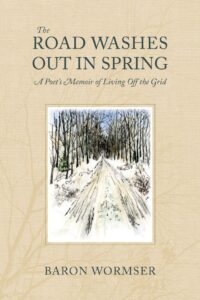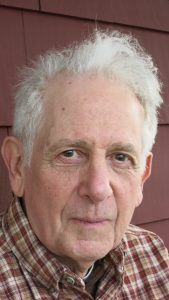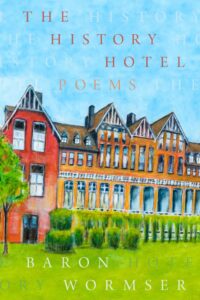התחל במצב לא מקוון עם האפליקציה Player FM !
Baron Wormser: The Road Washes Out in Spring
Manage episode 379126895 series 1070197
 The Road Washes Out in Spring: A Poet’s Memoir of Living Off the Grid – Baron Wormser – Brandeis University Press – 9781684581603 – 214 pages – paperback – $24.95 – March 7, 2023 – ebook versions available at lower prices
The Road Washes Out in Spring: A Poet’s Memoir of Living Off the Grid – Baron Wormser – Brandeis University Press – 9781684581603 – 214 pages – paperback – $24.95 – March 7, 2023 – ebook versions available at lower prices
Baron Wormser is a poet and prose writer whose work I have been familiar with for many years. Back in the 1970s, he and his wife Janet, moved to rural Maine as part of the “back to the land” wave that had been inspired by hippies and the Stewart Brand’s influential Whole Earth Catalog and especially the writings of the now almost mythic Helen and Scott Nearing, vegetarians who pioneered simple living in the 1930s and 40s.
His memoir of that time was originally published almost twenty years ago and now there is a new edition of this meditative, almost poetic narrative of simple living.
Baron and his family lived in a house they built in Maine with no electricity or running water. Much like the Nearings, they raised (and canned) much of their own food, carried water from their well, and read through the long winter nights by the light of kerosene lamps.
As Wormser states early in this book, living off the grid was not meant to be a statement of anything. In fact, as complete novices to the life they set out to live, it turned out that they had built their house in a place that there was no electricity and initially they could not afford to pay to have power lines run to their house. As time went on, they embraced the simplicity of their rural lives and learned from their experienced neighbors, for whom life was not a choice and “lifestyle” would have been a meaningless term.
Wormser refuses any simple understanding or explanation for the lives he and his wife chose for the twenty five year period during which they raised their children and became integral to the local community. He writes about nature and the simple life without sentimentalizing anything, appreciates the good and faces the difficulties head on without failing to note the complexity of everything we prefer to think of as simple. He is a careful thinker and writer, and his poetic self is a presence at all times. Here is a lovely excerpt from the book:
If there is such a thing as a mutable eternity, it is snow falling in the woods. I am thinking of a windless, steady plummeting. Nothing is moving except for snowflakes. You can hear the snow faintly ticking on the pine needle branches. You can hear it descending—a soft sift of air. You are held in the hand of something enormous yet gentle, something extraordinary yet calming, something evanescent yet quite palpable (from a Latin word meaning “to touch gently”). Every surface receives the snow in its way. A large, fallen, curled maple leaf collects the snow in its center. A boulder”s stored heat resists the snow at first. Then its surface turns wet as if it were raining. Then with un-boulder-like delicacy a thin frizz accumulates. On top of the garden gate a fragile white skein begins to perch. Little, almost derby-like hats grow on the garden fence posts. The mown grass around the house fills in gradually. The stiff, frozen blades seem like little heights. Then the snow, as it mounts, receives itself. Another landscape is created and for months we live in that landscape.
When I was in my twenties, I shared the impulse to “head for the country,” where I tried and failed to make a go of living on the land. I greatly admire and appreciate what the commitment that Baron and his family made to live in Maine for a quarter century. And it was a deep pleasure to read this memoir of that time.
In 2000 Baron was appointed Poet Laureate of Maine by Governor Angus King. He currently resides in Montpelier, Vermont, with his wife. In 2009 he joined the Fairfield University MFA program. He works in schools with both students and teachers. Wormser has received the Frederick Bock Prize from Poetry and the Kathryn A. Morton Prize along with fellowships from Bread Loaf, the National Endowment for the Arts and the John Simon Guggenheim Memorial Foundation. In 2000 he was writer in residence at the University of South Dakota. Wormser founded the Frost Place Conference on Poetry and Teaching and also the Frost Place Seminar. His most recent book of poetry is The History Hotel, published by CavanKerry Press.
In other rooms and beyond those rooms
So much was occurring that went on happily
And unhappily, indifferent to protocols,
Brimming with anemones, half-heard melodies,
Averted glances.
(from “Elegy for the Poet Adam Zagajewski”)
Buy The Road Washes Out in Spring
55 פרקים
Manage episode 379126895 series 1070197
 The Road Washes Out in Spring: A Poet’s Memoir of Living Off the Grid – Baron Wormser – Brandeis University Press – 9781684581603 – 214 pages – paperback – $24.95 – March 7, 2023 – ebook versions available at lower prices
The Road Washes Out in Spring: A Poet’s Memoir of Living Off the Grid – Baron Wormser – Brandeis University Press – 9781684581603 – 214 pages – paperback – $24.95 – March 7, 2023 – ebook versions available at lower prices
Baron Wormser is a poet and prose writer whose work I have been familiar with for many years. Back in the 1970s, he and his wife Janet, moved to rural Maine as part of the “back to the land” wave that had been inspired by hippies and the Stewart Brand’s influential Whole Earth Catalog and especially the writings of the now almost mythic Helen and Scott Nearing, vegetarians who pioneered simple living in the 1930s and 40s.
His memoir of that time was originally published almost twenty years ago and now there is a new edition of this meditative, almost poetic narrative of simple living.
Baron and his family lived in a house they built in Maine with no electricity or running water. Much like the Nearings, they raised (and canned) much of their own food, carried water from their well, and read through the long winter nights by the light of kerosene lamps.
As Wormser states early in this book, living off the grid was not meant to be a statement of anything. In fact, as complete novices to the life they set out to live, it turned out that they had built their house in a place that there was no electricity and initially they could not afford to pay to have power lines run to their house. As time went on, they embraced the simplicity of their rural lives and learned from their experienced neighbors, for whom life was not a choice and “lifestyle” would have been a meaningless term.
Wormser refuses any simple understanding or explanation for the lives he and his wife chose for the twenty five year period during which they raised their children and became integral to the local community. He writes about nature and the simple life without sentimentalizing anything, appreciates the good and faces the difficulties head on without failing to note the complexity of everything we prefer to think of as simple. He is a careful thinker and writer, and his poetic self is a presence at all times. Here is a lovely excerpt from the book:
If there is such a thing as a mutable eternity, it is snow falling in the woods. I am thinking of a windless, steady plummeting. Nothing is moving except for snowflakes. You can hear the snow faintly ticking on the pine needle branches. You can hear it descending—a soft sift of air. You are held in the hand of something enormous yet gentle, something extraordinary yet calming, something evanescent yet quite palpable (from a Latin word meaning “to touch gently”). Every surface receives the snow in its way. A large, fallen, curled maple leaf collects the snow in its center. A boulder”s stored heat resists the snow at first. Then its surface turns wet as if it were raining. Then with un-boulder-like delicacy a thin frizz accumulates. On top of the garden gate a fragile white skein begins to perch. Little, almost derby-like hats grow on the garden fence posts. The mown grass around the house fills in gradually. The stiff, frozen blades seem like little heights. Then the snow, as it mounts, receives itself. Another landscape is created and for months we live in that landscape.
When I was in my twenties, I shared the impulse to “head for the country,” where I tried and failed to make a go of living on the land. I greatly admire and appreciate what the commitment that Baron and his family made to live in Maine for a quarter century. And it was a deep pleasure to read this memoir of that time.
In 2000 Baron was appointed Poet Laureate of Maine by Governor Angus King. He currently resides in Montpelier, Vermont, with his wife. In 2009 he joined the Fairfield University MFA program. He works in schools with both students and teachers. Wormser has received the Frederick Bock Prize from Poetry and the Kathryn A. Morton Prize along with fellowships from Bread Loaf, the National Endowment for the Arts and the John Simon Guggenheim Memorial Foundation. In 2000 he was writer in residence at the University of South Dakota. Wormser founded the Frost Place Conference on Poetry and Teaching and also the Frost Place Seminar. His most recent book of poetry is The History Hotel, published by CavanKerry Press.
In other rooms and beyond those rooms
So much was occurring that went on happily
And unhappily, indifferent to protocols,
Brimming with anemones, half-heard melodies,
Averted glances.
(from “Elegy for the Poet Adam Zagajewski”)
Buy The Road Washes Out in Spring
55 פרקים
כל הפרקים
×ברוכים הבאים אל Player FM!
Player FM סורק את האינטרנט עבור פודקאסטים באיכות גבוהה בשבילכם כדי שתהנו מהם כרגע. זה יישום הפודקאסט הטוב ביותר והוא עובד על אנדרואיד, iPhone ואינטרנט. הירשמו לסנכרון מנויים במכשירים שונים.




